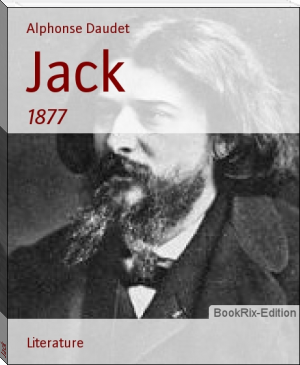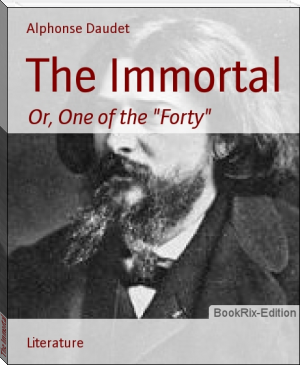Jack by Alphonse Daudet (web ebook reader txt) 📖

- Author: Alphonse Daudet
Book online «Jack by Alphonse Daudet (web ebook reader txt) 📖». Author Alphonse Daudet
After her child was asleep, Madame Weber, to economize coal and oil, brought her work to the room of her friend; she sowed in silence. It had been decided that they should not marry until spring, the winter to the poor being always a season of anxiety and privation. Jack, as he wrote, thought, "How happy they are." His own happiness came on Sundays. Never did any coquette take such pains with her toilette as did Jack on those days, for he was determined that nothing about him should remind Cecile of his daily toil; well might he have been taken for Prince Rodolphe had he been seen as he started off.
Delicious day! without hours or minutes--a day of uninterrupted felicity. The whole house greeted him warmly, a bright fire burned in the salon, flowers bloomed at the windows, and Cecile and the doctor made him feel how dear he was to them both. After they had dined, M. Rivals examined the work of the week, corrected everything, and explained all that had puzzled the youth.
Then came a walk through the woods, if the day was fair, and they often passed the chalet where Dr. Hirsch still came to pursue certain experiments. So black was the smoke that poured from the chimneys, that one would have fancied that the man was burning all the drugs in the world. "Don't you smell the poison?" said M. Rivals, indignantly. But the young people passed the house in silence; they instinctively felt that there were no kindly sentiments within those walls toward them, and, in fact, feared that the fanatic Dr. Hirsch was sent there as a spy. But what had they to fear, after all? Was not all intercourse between D'Argenton and Charlotte's son forever ended? For three months they had not met. Since Jack had been engaged to Cecile, and under-stood the dignity and purity of love, he had hated D'Argenton, making him responsible for the fault of his weak mother, whose chains were riveted more closely by the violence and tyranny under which a nobler nature would have revolted. Charlotte, who feared scenes and explanations, had relinquished all hope of reconciliation between these two men. She never mentioned her son to D'Argenton, and saw him only in secret.
She had even visited the machine-shop in a fiacre and closely veiled, and Jack's fellow-workmen had seen him talking earnestly with a woman elegant in appearance and still young. They circulated all sorts of gossip in regard to the mysterious visitor, which finally reached Jack's ears, who begged his mother not to expose herself to such remarks. They then saw each other in the gardens, or in some of the churches; for, like many other women of similar characteristics, she had become _devote_ as she grew old, as much from an overflow of idle sentimentality as from a passion for honors and ceremonies. In these rare and brief interviews Charlotte talked all the time, as was her habit, but with a worn, sad air. She said, however, that she was happy and at peace, and that she had every confidence in M. d'Argenton's brilliant future. But one day, as mother and son were leaving the church-door, she said to him, with some embarrassment, "Jack, can you let me have a little money for a few days? I have made some mistake in my accounts, and have not money enough to carry me to the end of the month, and I dare not ask D'Argenton for a penny."
He did not let her finish; he had just been paid off, and he placed the whole amount in his mother's hand. Then, in the bright sunshine he saw what the obscurity of the church had concealed: traces of tears and a look of despair on the face that was generally so smiling and fresh. Intense compassion filled his heart. "You are unhappy," he said; "come to me, I shall-be so glad to have you."
She started. "No, it is impossible," she said, in a low voice; "he has so many trials just now;" and she hurried away as if to escape some temptation.
CHAPTER XX.~~THE WEDDING-PARTY.
It was a summer morning. The pedler and his comrade were up before daybreak. One was sweeping and dusting, with as little noise as possible, careful not to disturb his companion, who was established at the open window. The sky was the cloudless one of June, pale blue with a faint tinge of rose still lingering in the east, that could be seen between the chimneys. In front of Jack was a zinc roof, which, when the sun was in mid-heaven, became a terrible mirror. At this moment it reflected faintly the tints of the sky, so that the tall chimneys looked like the masts of a vessel floating on a glittering sea. Below was heard the noise from the poultry owned by the various inhabitants of the Faubourg. Suddenly a cry was heard: "Madame Jacob! Madame Mathieu! Here is your bread."
It was four o'clock. The labors of the day had begun. The woman whose daily business it was to supply that quarter with bread from the baker's had begun her rounds. Her basket was filled with loaves of all sizes, sweet-smelling and warm. She carries them all through the corridors, placing them at the corners of the various doors; her shrill voice aroused the sleepers; doors opened and shut; childish voices uttered cries of joy, and little bare feet pattered to meet the good woman, and returned hugging a loaf as big as themselves, with that peculiar gesture that you see in the poor people who come out of the bake-shops, and which shows the thoughtful observer what that hard-earned bread signifies to them.
All the world is now astir; windows are thrown open, even those where the lamps have burned the greater part of the night. At one sits a sad-faced woman, at a sewing-machine, aided by a little girl, who hands her the several pieces of her work. At another a young girl, with hair already neatly braided, is carefully cutting a slice of bread for her slender breakfast, watching that no crumb shall fall on the floor she swept at daybreak. Further on is a window shaded by a large red curtain to keep off the reflection from the zinc roof. All these rooms open on the other side into a dark and ugly house of enormous size. But the student heeds nothing but his work. One sound only depresses him at times, and that is the voice of an old woman, who says every morning, before the noises of the street have begun, "How happy people ought to be who can go to the country on a day like this!" To whom does the poor woman utter these words, day after day? To the whole world, to herself, or only to the canary, whose cage, covered with fresh leaves, she hangs on the shutters? Perhaps she is talking to her flowers. Jack never knew, but he is much of her opinion, and would gladly echo her words; for his first waking thoughts turn toward a tranquil village street, toward a little green door, Jack has just reached this point in his reverie when a rustle of silk is heard, and the handle of his door rattles.
"Turn to the right," said Belisaire, who was making the coffee.
The handle is still aimlessly rattled. Belisaire, with the coffee-pot in his hand, impatiently throws it open, and Charlotte rushes in. Belisaire, stupefied at this inundation of flounces, feathers, and laces, bows again and again, while Jack's mother, who does not recognize him, excuses herself, and retreats toward the door.
"I beg your pardon, sir," she said; "I made a mistake."
At the sound of her voice Jack rises from his chair in astonishment
"Mother!" he cried.
She ran to him and took refuge in his arms.
"Save me, my child, save me! That man, for whom I have sacrificed everything,--my life and that of my child,--has beaten me cruelly. This morning, when he came in after two days' absence, I ventured to make some observation; I thought I had a right to speak. He flew into a frightful passion, and--"
The end of her sentence was lost in a torrent of tears and in convulsive sobs. Belisaire had retired at her first words, and discreetly closed the door after him. Jack looks at his mother, full of terror and pity. How pale and how changed she is! In the clear light of the young day the marks of time are clearly visible on her face, and the gray hairs, that she has not taken the trouble to conceal, shine like silver on her blue-veined temples. Without any attempt at controlling her emotion, she speaks without restraint, pouring forth all her wrongs.
"How I have suffered, Jack! He passes his life now at the cafes and in dissipation. Did you know that, when he went to Indret with that money, I was there in the village, and crazy to see you? He reproaches me with the bread you ate under his roof, and yet--yes, I will tell you what I never meant you to know--I had ten thousand francs of yours that were given to me for you exclusively. Well, D'Argenton put them into his Review; I know that he meant to pay you large interest, but the ten thousand francs have been swallowed up with all the others, and when I asked him if he did not intend to account to you for them, do you know what he did? He drew up a long bill of all that he has paid for you. Your board at Etiolles, that amounts to fifteen thousand francs. But he does not ask you to pay the difference; is not that very generous?" and Charlotte laughed sarcastically. "I tell you I have borne everything," she continued,--"the rages he has fallen into on your account, and the mean way in which he has talked with his friends of the affair at Indret; as if your innocence had never been fully established!
"And then to leave me in ignorance of his where-abouts, to spend his time with some countess in the Faubourg St. Germaine,--for those women are all crazy about him,--and then to receive my reproaches with such disdain, and finally to strike me! Me, Ida de Barancy! This was too much. I dressed, and put on my hat, and then I went to him. I said, 'Look at me, M. d'Argenton; look at me well; it is the last time that you will see me; I am going to my child.' And then I came away."
Jack had listened in silence to these revelations, growing paler and paler, and so filled with shame for the woman who narrated them that he could not look at her. When she had finished, he took her hand gently, and with much sweetness, but also with much solemnity, he said,--
"I thank you for having come to me, dear mother. Only one thing was lacking to complete my happiness, and that was your presence. Now take care! I shall never allow you to leave me."
"Leave you! No, Jack; we will always live together--we two. You know I told you that the day would come when I should need you. It has come now."
Under her son's caresses she became tranquillized. There came an occasional sob, like a child who has wept for a long time.
"You see," she said, "how happy we may be. I owe you much care and tenderness. I feel now that I can breathe freely. Your room is bare and small, but it seems to me like Paradise itself."
This brief summary of the apartment regarded by Belisaire as so magnificent, disturbed Jack somewhat as to the future; but he had no time now for discussions; he had but
 Have you ever thought about what fiction is? Probably, such a question may seem surprising: and so everything is clear. Every person throughout his life has to repeatedly create the works he needs for specific purposes - statements, autobiographies, dictations - using not gypsum or clay, not musical notes, not paints, but just a word. At the same time, almost every person will be very surprised if he is told that he thereby created a work of fiction, which is very different from visual art, music and sculpture making. However, everyone understands that a student's essay or dictation is fundamentally different from novels, short stories, news that are created by professional writers. In the works of professionals there is the most important difference - excogitation. But, oddly enough, in a school literature course, you don’t realize the full power of fiction. So using our website in your free time discover fiction for yourself.
Have you ever thought about what fiction is? Probably, such a question may seem surprising: and so everything is clear. Every person throughout his life has to repeatedly create the works he needs for specific purposes - statements, autobiographies, dictations - using not gypsum or clay, not musical notes, not paints, but just a word. At the same time, almost every person will be very surprised if he is told that he thereby created a work of fiction, which is very different from visual art, music and sculpture making. However, everyone understands that a student's essay or dictation is fundamentally different from novels, short stories, news that are created by professional writers. In the works of professionals there is the most important difference - excogitation. But, oddly enough, in a school literature course, you don’t realize the full power of fiction. So using our website in your free time discover fiction for yourself. 




Comments (0)